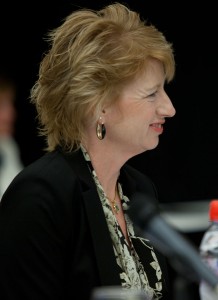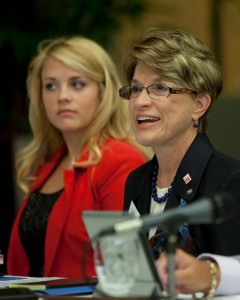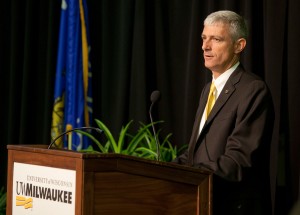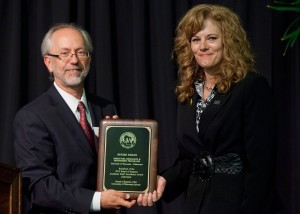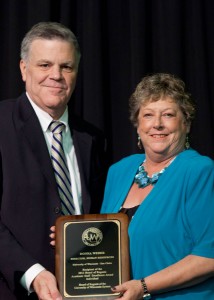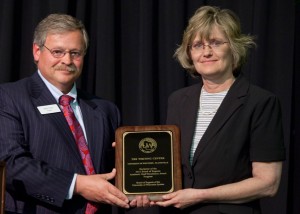MILWAUKEE, Wis. – As part of approving a $5.9-billion annual operating budget, the University of Wisconsin System Board of Regents, after long discussion, today approved by a 17-1 vote a 5.5% average tuition increase for resident undergraduates at the UW System’s four-year campuses.
The same 5.5% tuition increase was also approved for the 13 freshman-sophomore UW Colleges.
Noting the challenging economic times, UW System President Kevin P. Reilly said the recommended “modest, predictable tuition increase” would provide some additional revenue to campuses.
Reilly said the tuition increase would also “help ensure that students get the classes they need to graduate on time, in a safe, productive learning environment. Through this balanced approach, we can maintain UW’s historic commitments to both affordability and academic excellence.”
The State of Wisconsin’s 2011-13 biennial budget reduced funding to the UW System by $250 million. An additional budget lapse approved in February 2012 withdrew an additional $66 million in taxpayer support. In addition to these reductions in operating revenues, all UW employees are paying for a larger portion of their health and retirement benefits.
Added to last year’s 5.5% tuition increase, the new rates proposed for the coming academic year would result in a total of $110 million in new tuition revenue for UW institutions over the two-year period. The $110 million represents about one-third of the funds needed to offset budget cuts and lapses, Reilly said.
- See the UW System news release of June 4
- See UW System PowerPoint on
The recommended tuition increase would mean UW-Madison tuition will rise by a total of $681 for the coming academic year. That total includes a 5.5% general tuition increase of $431, plus the $250 differential tuition increase for the Madison Initiative for Undergraduates.
With the 5.5% increase, tuition at UW-Milwaukee would increase by $422 annually. At the comprehensive campuses, the average increase would be $368 annually.
Reilly emphasized that in each case, UW tuition and fees are below the midpoint of their respective peer groups.
Several Regents expressed concern about implementing a tuition hike.
Citing intense public interest in college costs, Regent Jerry Whitburn proposed an amendment, calling for a 4% tuition increase, rather than the 5.5% rate increase forwarded by UW System.
“Where does the money come from for the dentist, let alone this hike?” Whitburn asked. “Over (the past) three years, we’ve already taken tuition up 16.5%, and now we propose to take it up even more. Our economic circumstance is not business as usual. I think the bite is too great.”
Whitburn acknowledged that the proposed amendment would create challenges for UW campuses, reducing expected revenues by about $10 million for the year. His amendment generated lengthy discussion.
UW-Milwaukee Chancellor Mike Lovell encouraged regents to consider the impact of further reductions to academic programs.
“I’m already worried about degrading the quality of the educational experience for students,” Lovell said. He pointed to already high ratios of students to providers of student services such as mental health counselors and academic advisers. He also noted that the availability of fewer class sections would lengthen students’ time to degree, thereby increasing their costs.
“The fact is,” Lovell said, “we based our budgets on campus on this 5.5% increase.”
Regent Regina Millner urged Board members to remember that belt-tightening cannot proceed indefinitely without compromising the quality of the product. “There is some point when you’re eliminating fat, you’re also eliminating muscle,” she said.
Regent David Walsh argued that taking revenue away from the UW at this point would be a bad decision. He noted that the UW’s administrative costs are among the lowest in the country, and that UW faculty and staff have “taken it on the chin” as far as compensation. “These are the people, ironically, who have increased our production of graduates,” Walsh said.
Echoing concerns expressed by several Regents, Reilly reiterated that the UW is painfully aware of the economic challenges facing families around the state, but “we have a responsibility to maintain the quality of what generations before us have built.” He added that even with a 5.5% tuition hike, it will be a “mighty struggle” to maintain quality.
Regent Katherine Pointer, a student at UW-Madison, agreed. As someone who would be affected first-hand by a tuition hike, she acknowledged “the increase would hurt a lot,” but she understands and accepts the reasoning behind that hike.
“For me, the reason that I’m comfortable voting for the 5.5 percent tuition increase is because I know how necessary it is,” she said. “In conversations with President Reilly and with the chancellors, I’ve seen that if we do anything less this will cut to the muscle of the system and of the education that students receive.”
Acknowledging the struggle Regents face every time they must consider a tuition hike, Regent José Vásquez urged colleagues to remember that “even as a public institution, we are competing for our customers.” He added, “Many businesses, even in the throes of an economic down cycle, will continue to invest in equipment and personnel …. You have to keep an eye to the future.”
Regent Manydeeds said there is “a lot of thought and anguish and soul-searching at this part of our job.” He said that ultimately the Board must “trust our Chancellors who are telling us this is what they need to operate at a bare-bones minimum,” and trust the experience of those who have been through such decisions before, “realizing they’re doing it for the betterment of the systems we’re serving.”
Student Regent Tracy Hribar, noting that she is currently paying college tuition for her children as well as herself, urged colleagues to remember “we have to invest in students and our state so they make money for all of us.” She also reported her first-hand experience with having her “finger on the button” in order to register for limited spots in needed classes.
The amendment for a lower tuition increase ultimately was voted down 15-3.
Regent Millner was among several Board members who noted their appreciation for the discussion prompted by Regent Whitburn’s proposal. “Continued reliance on tuition from students is not feasible going forward,” Millner said, adding that alternative strategies must be considered to avoid placing the burden on the backs of students.
Regent Tony Evers, state superintendent of public instruction, said K-12 and higher education are facing a common struggle in declining state support. “We absolutely have to find resources where we can,” he said.
In the final 17-1 vote on the operating budget, Regent John Drew was the lone dissenter.
“I can’t vote for a tuition increase when there is no increase in financial aid for the neediest students,” Drew said. “I don’t accept the new normal we have to deal with in this state, with ever-declining aid, ever-increasing tuition, ever-increasing student debt.”
Reilly told the Board that more than 70% of UW System undergraduates receive some form of financial aid, and almost two-thirds of those receive at least one outright grant or scholarship.
The Regents then unanimously approved UW System’s recommendation for a 5.5% increase in Wisconsin Higher Education Grant funding for each year of the biennium. That level of funding would provide WHEG funding for an additional 4,000 to 6,000 students.
- See UW System PowerPoint on
UWM focuses on places, programs and people
As UW-Milwaukee helps to build a better Wisconsin, its places, programs and people are pivotal, host Chancellor Mike Lovell told the full Board. UWM has $300 million in capital projects under way, but places have no value without strong and relevant programs, Lovell said. “The best places and programs would not matter if we did not have the best people.”
Five UWM videos were used to illustrate the presentation, titled “UW-Milwaukee: Building a Better Wisconsin:”
- The “places” theme was demonstrated by a video that chronicled the groundbreaking at the School of Freshwater Sciences that took place the preceding evening.
- “Programs” were shown through a video of the new multimillion-dollar research laboratories funded by Johnson Controls that have been built in partnership with the College of Engineering and Applied Science on the UWM campus. A second “programs” video examined the progressive research being done at the School of Freshwater Sciences.
- The “people” of UWM were represented in two videos from the university’s Spotlight on Excellence series: Anne Basting and Cedric Humphrey.
Chancellor Lovell also explained how UWM is supporting its people through its Best Place to Work process. Several initiatives are moving forward in the areas of leadership, career, workplace and rewards. He said the university continues its dual mission of research and access, and has added the new component of becoming the best place to learn and work. The emphasis ties in to the university’s new vision statement that was developed by individuals from across campus over the past year.
Chancellor Lovell was joined by MaryAnn Wright, Vice President Global Technology and Innovation for Johnson Controls Power Solutions; Dean Amhaus, Executive Director of theMilwaukee Water Council; Magda Peck, Dean of the Joseph J. Zilber School of Public Health; and David Garman, Dean of the School of Freshwater Sciences. Both of the deans have joined UWM in the past year and are the founding lead academic officers for their schools.
New Regents introduced
The Board welcomed three new members. Regent John Behling is Vice President of the Weld, Riley, Prenn & Ricci law firm in Eau Claire. He previously served as an aide to Gov. Tommy Thompson.
Regent Regina Millner, of Madison, has been involved in commercial real estate for more than 30 years, as a lawyer, consultant, appraiser and broker. She is very active in the Madison community and has chaired the boards of numerous organizations.
Regent Tracy Hribar is the new Non-Traditional Student Regent. She has been active in small business since 1996, serving as Business Manager for James Hribar Trucking, a family business located in Raymond, Wis. She is currently pursuing a double major in Economics and Business Management at UW-Parkside, and expects to complete her B.S. degree in 2014.
Board salutes outgoing members
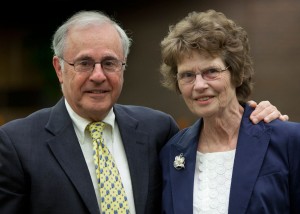
Regent President Emeritus Michael Spector and Regent Emerita Judith Crain were honored at the June Board of Regents meeting hosted by UWM.
Regents offered resolutions of appreciation to two colleagues whose terms of service have ended: Regent Judy Crain of Green Bay and Regent President Emeritus Michael Spector of Milwaukee.
In presenting the resolution for Regent Crain, who’d been on the Board since 2005, Regent & David Walsh noted that in her extensive community involvement, she has “lived a full life doing something for people in education.” He added, “In her own quiet, stern way, she made sure that everyone had the opportunity to be heard. She had an open mind and asked lot of good questions … and brought a lot of people together in very difficult situations.”
Regent Crain told the Board that she has long driven a car proudly bearing the bumper sticker, “I believe in public education.” “The importance of first-rate education from early-childhood to higher education cannot be broadcast loudly and widely enough. This has been the focus of much of my life,” Crain said. “I see all aspects of public education in one piece as our communal responsibility to each other for the future.”
In introducing Regent Spector, a Board member since 2005, Regent Chuck Pruitt saluted the former Board president’s deep and abiding commitment to higher education, his love for the UW, and his integrity and diplomacy. “Our work today here is very different than it was a year ago when Mike became president of this Board,” Pruitt said, “and we all owe him an enormous debt of gratitude for that.”
Noting the broad range of issues he’d been involved in during his term, from Rose Bowl appearances to averting a potential System break-up, Spector said the abiding concern is preserving the UW’s quality. “Nothing dilutes a brand more than a diminishing of core quality,” he said.
Regents present Academic Staff Awards for Excellence
The Board honored this year’s recipients of the Academic Staff Awards for Excellence, the highest recognition bestowed on members of the UW System’s academic staff.
The 2012 recipients are:
- Denise Ehlen, Director of Research and Sponsored Programs, UW-Whitewater
- Donna Weber, Director of Human Resources, UW-Eau Claire
- UW-Platteville Writing Center
Regent John Drew, who chaired the selection committee, said the awards recognize “the hard work, dedication, and innovative thinking of our talented academic staff members.”
- See the UW System news release of May 30
Regent Drew introduced Denise Ehlen, the first individual Award of Excellence recipient. Ehlen, who originally joined UW-Whitewater in 1992 as a member of the support staff in New Student Programs, moved up through the ranks to her current position as Director of the Office of Research and Sponsored Programs. Drew noted that under Ehlen’s leadership, the amount of extramural funding acquired by the campus had increased more than 300% over the preceding decade. He added that Ehlen’s efforts and contributions have been called “pivotal in transforming the campus.”
Ehlen told Regents that she believes “Excellence occurs at the intersection of leadership, innovation, creativity and hard work.” She noted that her team’s charge has been to help change the university’s mission to focus on entrepreneurship, intrapreneurship, engagement and technology transfer. “Five years ago, it would have been inconceivable that this institution would have the will, resources or capacity to engage in these activities,” she said. “This award is recognition of Whitewater’s strong campus leadership.”
Regent Brent Smith presented the second individual Award for Excellence to Donna Weber, Director of Human Resources at UW-Eau Claire. “Between furloughs, alterations in collective bargaining, rescinded pay raises, benefits changes, budget bills and lapses, new software systems, and assorted other challenges big and small, the past few years have made Human Resources a very interesting place to work,” Smith said. Through it all, he noted, Donna has been what former Chancellor Brian Levin-Stankevich called “a trusted, calm force.”
In accepting the award, Weber said success in human resources goes back to lessons she learned growing up on a dairy farm, that treating people with respect and dignity is key. She noted that over the years she has had the opportunity to interact with people on real-life matters, from the birth of a child, to adjusting to other life changes such as marriage, divorce, illness, or job loss. She said that for her, working in human resources “comes from within. It’s not a job, it’s who I am.”
Regent Mark Tyler presented the program award to the UW-Platteville Writing Center, which served more than 1,400 students in 2010, helping them to become more confident, effective writers. Tyler noted that in addition to one-on-one work with students, the Writing Center staff also helps faculty develop or revise courses to include more writing, expands campus outreach to underrepresented or underserved populations, and offers presentations on subjects like effective library research and avoiding plagiarism.
Evelyn Martens, the Center’s Director of Writing and Tutoring Resources, said that many people share the credit for the Center’s success, particularly the peer tutors, “who go in every day and do very, very complex jobs for essentially minimum wage.” She added that it’s not always easy for faculty outside writing disciplines to understand what they do, but the campus has provided strong support for the Center’s services.
Education Committee
UW-Milwaukee Presentation: Building a Healthier Wisconsin
The UW -Milwaukee provost and deans of three of the university’s schools and colleges made a presentation to the Education Committee on what UWM is doing to build a healthier Wisconsin.
Provost Johannes Britz, Chukuka Enwemeka of the College of Health Sciences, Dean Magda Peck of the Joseph J. Zilber School of Public Health, Dean Sally Lundeen of the College of Nursing stressed the university’s strong portfolio of health-related initiatives and centers, which involve multiple partnerships within the university, with other institutions and with community organizations.
The focus of UWM’s efforts is on work that addresses chronic health problems, promotes healthy choices, creates healthy environments and helps develop policies that impact access and cost of health care.
Although UWM collaborates with local academic medical programs, “we are not a medical health center,” stressed Peck. “We are a health-focused university. Achieving optimal health is much, much more than medical care.”
The deans talked about several examples of collaborative work being done through The College of Nursing’s community nursing centers, the Center for Urban Population Health and the Children’s Environmental Health Sciences Core Health Center.
An advantage UWM has is that it is based in the city of Milwaukee, allowing the university to become involved in community-wide issues such as teen pregnancy, obesity, chronic health conditions like asthma, and disparities in access to health care.
Dean Enwemeka mentioned that the university’s location allows it to recruit and prepare healthcare workers from underrepresented groups. Dean Peck also noted that many of the solutions found in urban areas can also be applied to n rural areas. “We are anchored in Milwaukee, but we can impact Southeast Wisconsin and beyond.”
Regents José Vásquez and Mark Tyler had questions about the current reimbursement system, which focuses on paying for treatment rather than prevention, and its impact on health care costs.
Dean Lundeen agreed that the type of healthcare promotion and prevention that UWM’s nursing centers, for example, do absolutely can help control costs. Dean Peck noted that what the university learns from research can influence sound, evidence-based policies.
Regents briefed on UW-Parkside Teacher Education Program
Provost Terry Brown updated Regents on UW-Parkside’s revamped teacher education program.
In 2010, UW-Parkside suspended its teacher education program, following serious problems identified by the State’s Department of Public Instruction. The plan then was to develop an innovative, 21st-century program to take the place of the previous program.
Brown said the new program will not provide education degrees but will instead be a teacher licensure program. The program was approved by faculty governance in May.
Parkside has consulted DPI throughout the process, Brown said, and the new program has been designed with the broad input of UW-Parkside faculty and staff, as well as education, community and business leaders from Kenosha-Racine. The new program will be rolled out in fall 2013.
“We’ve designed an innovative program to help educators meet the realities and challenges of the 21st century,” said Brown. “The work with our partners in higher education (public and private) was scholarly, informed by the best research in the field – and I have never viewed a more collaborative process.”
Brown was congratulated by Senior Vice President Mark Nook and Regents Tony Evers and José Vásquez.
Academic program planning, review and approval process discussed
As part of continuing efforts to devolve greater authority to the institutions, the Education Committee heard a report from the UW System Working Group on Program Planning and Review on recommended changes.
Among those changes, the current entitlement process will be replaced with a “pre-authorization” process, in which the institution submits a “letter of intent” to plan a new program. After fielding feedback from other UW institutions, the Office of Academic Affairs has the authority to approve or deny the pre-authorization.
Other changes to the current authorization process include a reduced role for UW System Administration and a reduced timeline for bringing new programs to the Board of Regents. Involvement of the Office of Academic Affairs in the five-year review of new academic programs also will be eliminated, with institutions following their own regularly scheduled review processes.
Regent Tim Higgins said that the Working Group “did a great job of combing through the process.” Regent José Vásquez asked about the time frames involved, and why five years were allowed to get a program “up and running.”
Senior Vice President Mark Nook said that while UW System wants to make sure adequate time is allowed, it is also prudent to give an end date for a proposal.
Associate Vice President Stephen Kolison emphasized that the Working Group wanted to make sure that System was not a “bottleneck” when proposals arrive.
In other business, the Education Committee:
- Approved UW-Parkside’s Bachelor of Science in Environmental Studies;
- Approved UW-Whitewater’s Bachelor of Business Administration in International Business
- Approved UW-Green Bay’s Online Master of Science in Nursing;
- Accepted the proffer from the Trustees of the William F. Vilas Trust Estate for the support of scholarships, fellowships, professorships, and special programs in the arts and humanities, social sciences, and music; and
- Approved the 2012 Report on Faculty Promotions, Tenure Designations, and Other Changes of Status.
Joint meeting of the Business, Finance, and Audit Committee Committeeand the Capital Planning & Budget Committee
UW-Milwaukee showcases campus building projects
Vice Chancellor Christy Brown led a UW-Milwaukee presentation, “Building a Better Wisconsin, Construction Underway and Beyond,” before a joint session of the Business, Finance & Audit Committee and the Capital Planning & Budget Committee.
- See the UWM PowerPoint presentation, “ ”
Highlighting the status of the Milwaukee Initiative, Brown described the portions already completed and the building projects that are now underway or soon to begin. Brown pointed out that this initiative will provide more than 4,000 construction jobs as well as enable growth in research activities, which should also lead to new private sector jobs in Wisconsin.
Business, Finance, and Audit Committee Committee
Audit recommends additional safeguards for minors on campus
An audit conducted by UW System’s Office of Operations Review and Audit is recommending that background checks for employees and others who work with children on UW premises be expanded.
The audit was requested by the Business, Finance & Audit Committee in December 2011, in the wake of a child sex abuse scandal at Penn State University.
“I believe, generally speaking, we’re doing OK,” said Elizabeth Dionne, Director of Operations Review and Audit. She said that most institutions have policies and procedures in place to safeguard minors who participate in UW activities.
She added that there is some industry urgency to addressing these concerns, however, and peer institutions have started implementing similar measures.
“As parents look to send their children to camps and clinics, they’re going to want to be sure we have those policies and procedures in place,” Dionne said.
- See the PowerPoint on “ ”
Dionne noted that while UW System’s offerings are generally targeted toward adult learners, tens of thousands of children participate in formal and informal programs, service offerings, and activities on campuses, such as pre-college programs, camps, clinics, theatre programs, tours, sports tournaments and more.
Since 2006, criminal background checks are required for all new UW System employees. In addition, Gov. Walker issued an Executive Order last December requiring that all UW System employees report instances of child abuse or neglect to the police or to a local child protective services agency.
Dionne said that while UW institutions have implemented a wide range of controls, formal and informal, to help ensure the safety and welfare of youth participants in UW sponsored programs and activities, promoting consistency of policies and practices would further mitigate the risk of exposing youth to unsafe environments.
Suggested areas of improvement include requiring that all employees working in a “position of trust” with children should undergo a criminal background check once every four years; implementation of a screening process for volunteers who work with children; and better education and training of employees about reporting suspected abuse.
The Committee unanimously approved a resolution endorsing the recommendations presented.
Report of the Senior Vice President
Senior Vice President Michael Morgan presented the final report summarizing the implementation and total cost of the University’s new Human Resource System. The project was completed on-time and under budget, he said.
Associate Vice President for Human Resources and Workforce Diversity Al Crist also offered an update on the latest developments with the new University Personnel Systems currently being developed for UW-Madison and the balance of the UW System institutions.
Crist said the development of two more effective personnel systems “an historic opportunity.”
In other business, the Business, Finance, and Audit Committee:
- Heard a report from Vice President for Finance Debbie Durcan on gift, grant, and contract awards for the period July 1, 2011 through March 31, 2012; total awards for the period were approximately $1.2B, an increase of $14.0M compared to the prior year;
- Approved a seven-year agreement for laundry services between UW-Oshkosh and Mac-Gray Corporation;
- Approved a five-year, fee-for-service agreement between UW-Madison and PharmaNet, LLC wherein the University will provide photograph reading services to PharmaNet; and
- Approved a proposal to amend, restate, and extend an agreement between the UW-Madison Athletic department and Learfield Communications; the amended agreement includes a $4.8M capital subsidy to Athletics for the new main scoreboard and additional signage, partnership, and naming rights opportunities for the vendor.
Capital Planning and Budget Committee
Associate Vice President’s Report
Associate Vice President David Miller reported to the Committee that the Building Commission approved about $129M for projects at April May meeting. The funding for those projects is approximately $74M General Fund Supported Borrowing, $19M Program Revenue, and $36M Gift Funds. UW System did not have any items on the building commission’s May agenda.
UWM’s expanded Kenwood project approved
The Capital Planning & Budget Committee approved UW-Milwaukee’s request for authority to increase the project scope and budget in construction of the Kenwood Interdisciplinary Research Complex-Phase I. The building’s plan has been amended to add wet labs that push the $75M project to $80M.
Regent Gary Roberts expressed concern for the amount of operational costs being taken on, not only for KIRC, but all the new building going on at UW-Milwaukee.
“They are adding all this fixed cost. With all this new building, if there’s no plan for that, it doesn’t sound responsible,” Roberts said.
Brown said the cost of the additional wet labs in the KIRC are needed by the School of Public Health and will be covered with the cost returns the faculty will receive as a result of increased sponsored funding for research.
School of Public Health Dean Magda Peck said she doesn’t want the labs — which are needed for the environmental health branch of the school — to be the obstacle that keeps the school from becoming the first accredited school of public health in the state.
Roberts voted to approve the measure, but added that in the future the board should require a better plan for ensuring that operational costs can be absorbed with new buildings.
In other business, the Capital Planning & Budget Committee:
- Approved UW-Milwaukee’s request for authority to increase the project scope and budget and construct the $80M Kenwood Interdisciplinary Research Complex-Phase I project;
- Approved UW Colleges’ request for authority to amend the Lease Agreement with Outagamie County and Winnebago County to add acreage and an industrial building for the UW-Fox Valley campus; when renovated, the building will serve the successful and growing collaborative bachelor of engineering degree program with UW-Platteville by housing all the activities of the engineering program;
- Approved UW-Madison’s request for authority to construct the $1.5M gift-funded General Library System Storage Addition project, which will construct an addition to the existing Materials Distribution Services warehouse in Verona to provide high-density storage space for approximately 850,000 volumes of library materials for campus libraries;
- Approved UW-Madison’s request for authority to construct the Elizabeth Waters Renovation project at a cost of $7.1 Program Revenue Supported Borrowing;
- Approved UW-Madison’s request for authority to trade approximately 7,247 square feet of land with the city of Madison for a parcel of the same size, which is located in the city of Madison; the trade will assist the city in avoiding potential impacts to an historic burial site, as it extends Elderberry Road near the West Madison Agricultural Research Station;
- Approved UW Hospital and Clinics Authority’s request for the American Family Children’s Hospital Addition project to construct a 7th and 8th floor addition to the existing children’s hospital, which is part of the Clinical Sciences Center on the UW-Madison campus;
- Approved UW-Milwaukee’s request for authority to construct the $11.9M Northwest Quadrant Children’s Center Relocation project, which was designated as part of the Milwaukee Master Plan Initiative – Phase I enumeration;
- Approved UW-Milwaukee’s request for authority to lease space at the Innovation Accelerator Building for the College of Engineering and Applied Science and the College of Health Sciences;
- Approved UW-Milwaukee’s request for authority to enter into a lease of the Cozzens-Cudahy Research Center premises to support the Division of Academic Affairs and Research; and
- Approved a UW System request for 10 All Agency Maintenance and Repair projects on three campuses totaling about $14M.
Editor’s note: Laura Hunt, Beth Stafford, and Brad Stratton of UW-Milwaukee contributed to this report.
###
The UW System Board of Regents will resume its June 2012 meeting at 9 a.m. on Friday, June 8,
at 9 a.m. at the UW-Milwaukee Union
Related: June 8 (day 2) news summary

